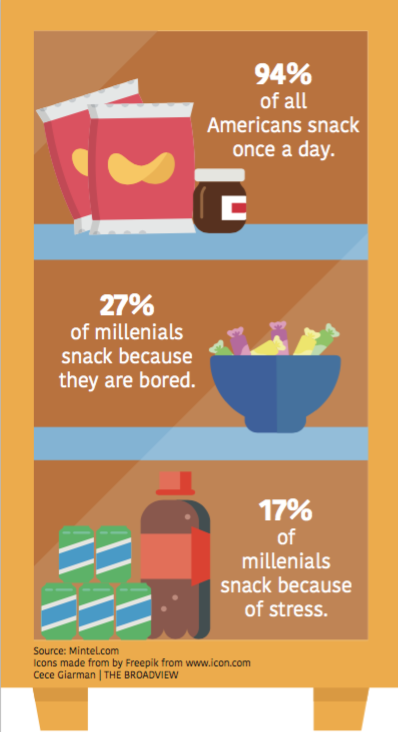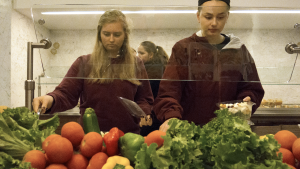Snack attack
May 17, 2017
Munching on some jelly beans, reaching for another Dorito or binging on a pint of ice cream may seem like ordinary forces of habit, but everyday snacking can unwittingly lead the way to long-term health problems.
“Whenever there is food around, I eat it, and when there’s not, I just forget that I’m hungry,” junior Natalie Lunbeck said. “I’m usually too distracted or busy to consciously think about it.”
Mindless snacking often happens when foods are convenient, but these kinds of foods tend to be unhealthy snacks or fast food, according to dietitian Kathy Cleary.
“They’re around us in all stores, quickstops and gas stations,” Cleary said. “It’s really easy to get that kind of food, while it’s a little harder to get fruits and vegetables because they’re not always available.”
With healthy snacks such as fruits, vegetables, whole grains and yogurt being inconvenient, munching on foods with high amounts of fat, sugar and sodium — such as chips, candy and doughnuts — becomes easier according to Cleary.
“That can add to obesity problems and can lead to Type 2 diabetes if you don’t control your weight over long periods of time,” Cleary said. “It can lead to hypertension problems, which have to be treated with medication if it’s out of control.”
Foods like white breads and pastas may seem like harmless, healthy options to snack on but can drastically increase blood sugar levels and result in a “crash,” according to Livestrong.
Junior Natalie Lunbeck rarely eats the recommended five servings of fruits and vegetables each day because they are less convenient and appetizing, according to Lunbeck.
“A lot of times in our house, all the apples aren’t fresh and usually past ripe, or the vegetables aren’t cooked,” Lundbeck said. “I’ll open up my fridge and eat the thing that I’m most excited to see — and that’s usually pasta or cookies.”
Sophomore Camilla Sigmund also finds mindless snacking part of her eating habits.
“Whatever’s put in front of me, I consume,” Sigmund said. “If somebody put a plate of pasta in front of me I’d eat it, but if someone put two plates of pasta, even if I’m the same amount of hungry, I’d eat them both.”
Snacking while stressed can also detrimentally affect health, and often is an excuse to binge eat or eat unhealthy foods, according to school counselor Annie Egan.
“Some people don’t even notice they’re eating because they’re stressed,” Egan said. “Other times it’s conscious like ‘I’m so stressed out — I’m going to pig-out on french fries.’ It is a way for some people to regain control over something that is beyond control.”
Egan recommends finding something else to do such as taking a walk, drawing or listening to a podcast instead of stress-snacking.
“It could make you feel lethargic,” Egan said. “Generally when people are stress eating, they’re not eating carrots and celery. They’re eating food that is a little bit more indulgent that probably isn’t the best for making your brain work faster and more efficiently, whether you’re stressed or not.”












